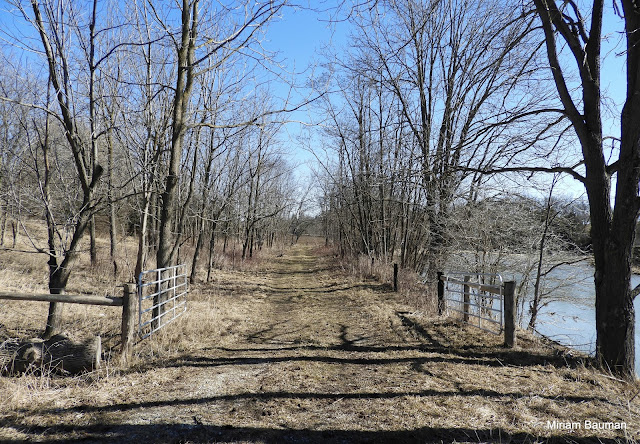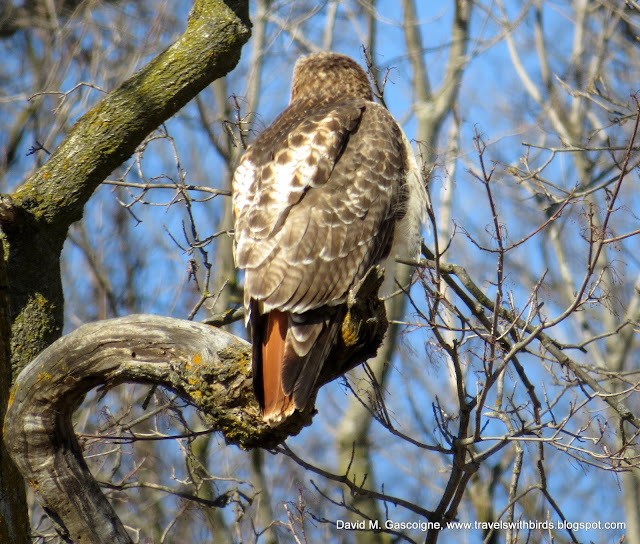The biggest story here is the amazingly benign weather we are having, in total contrast to what we see from Europe on the television news.
Overnight last Thursday we were forecast to get a substantial snowfall but it fizzled out and what we received barely coated the ground, and was gone by mid afternoon.
When we looked out of the window on Friday morning the first American Robin (Turdus migratorius) of the spring was in the backyard.
Many robins spend the winter here of late, with the result that the first migrants no longer generate the excitement they used to in times past when their presence was a true signal that spring had come.
You can see the paltry amount of snow that I referred to above. The daytime temperatures are now consistently in the plus column and as you may see the Conestogo River is totally ice-free and the fields and lanes are bare.
We noticed an American Goldfinch (Spinus tristis) at one of our feeders the other day with a bad case of avian conjunctivitis (Mycoplasma gallisepticum) in one eye. The pictures below show the "good" side and the "bad" side.
This condition is generally indicative of other health problems in the bird, but doubtless it renders the individual far more prone to predation by accipiters who can attack it from the blind side. Mouldy bird seed, or an accumulation of bird droppings and stale food contribute to this condition, and it helps to clean bird feeders in a 10% bleach solution before refilling them. Metal, plastic and glass surfaces are much preferred over wood.
Yesterday, while out and about on a little birding foray, the highlight was this stunning male Red-bellied Woodpecker (Melanerpes carolinus).
Red-tailed Hawks (Buteo jamaicensis) are pairing off and we saw evidence of this a couple of times yesterday. One member of the pair remained long enough for a few pictures.
Each day now holds the possibility of new migrants so there is a great deal of anticipation each time we go out. Riverside Park in Cambridge is the destination for tomorrow's Ramble with David. Stay tuned for what we might see there.
This condition is generally indicative of other health problems in the bird, but doubtless it renders the individual far more prone to predation by accipiters who can attack it from the blind side. Mouldy bird seed, or an accumulation of bird droppings and stale food contribute to this condition, and it helps to clean bird feeders in a 10% bleach solution before refilling them. Metal, plastic and glass surfaces are much preferred over wood.
Yesterday, while out and about on a little birding foray, the highlight was this stunning male Red-bellied Woodpecker (Melanerpes carolinus).
Red-tailed Hawks (Buteo jamaicensis) are pairing off and we saw evidence of this a couple of times yesterday. One member of the pair remained long enough for a few pictures.
Each day now holds the possibility of new migrants so there is a great deal of anticipation each time we go out. Riverside Park in Cambridge is the destination for tomorrow's Ramble with David. Stay tuned for what we might see there.































